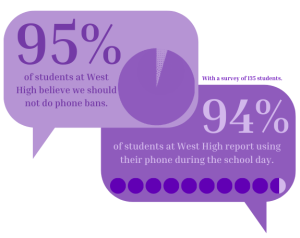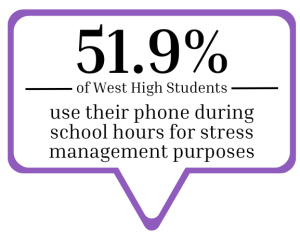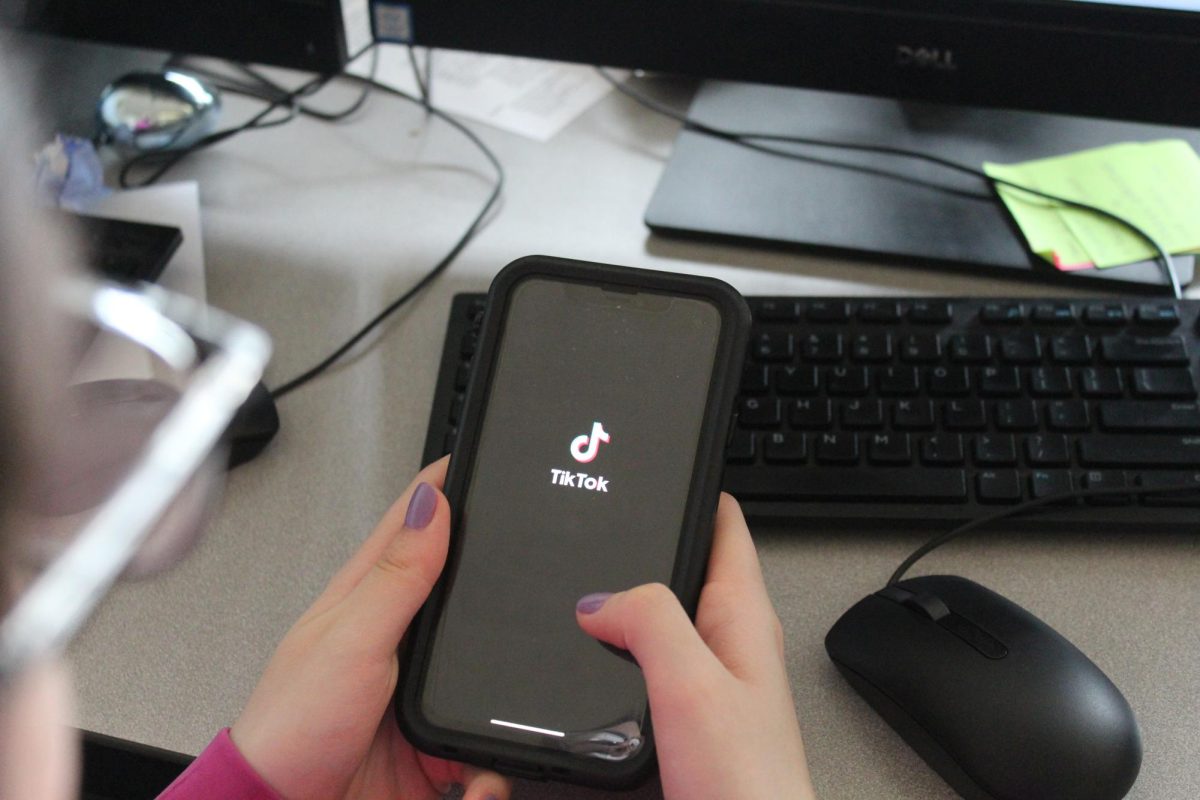During a recent interview with the Gray Media Iowa Capitol Bureau, Iowa Governor Kim Reynolds announced her intent to address phone use in schools. She spoke to districts across the state, including Ankeny, Ames, Dallas Center-Grimes and Ottumwa, which have implemented various levels of cell phone restrictions. While some schools ban phones during the entire school day, others limit their use to specific classrooms. These policies have gained traction nationally.
Other schools across the state have already implemented phone bans. For example, Storm Lake School, located in Storm Lake, Iowa, has approved a complete ban on cell phones. Students cannot bring phones to school at all. If caught with a phone, it’s confiscated for the day and repeated violations require a parent meeting.
While Governor Reynold’s proposal to ban phones in classrooms aims to reduce distractions and enhance academic focus, it overlooks the important role that phones play in ensuring student safety and communication.
Governor Reynolds argues that “Kids need to focus on learning,” suggesting that personal electronic devices are major distractions. However, this perspective doesn’t account for today’s school environment, where phones can be essential safety tools. In dangerous situations—which occur too frequently—the ability to quickly contact parents or emergency services can be crucial. Phones enable students to alert authorities, share real-time information, and ensure their safety. Removing these devices leaves students and staff more vulnerable.
In an interview with our administrator, Dr. Andy Miehe, Miehe shared his opinion and thoughts regarding banning phones in schools.
Wahawk Insider: What do you think about safety concerns regarding students having their phones on them, and do you believe it makes students feel more secure?
Andy Miehe: I do not believe there are any negative consequences regarding safety for students if phones are not allowed to be used during the school day. There are several anecdotal cases where students who are in buildings and districts with phone bans in place state that they feel relieved to not have to “keep up” and “tune in” to their socials at all times. Students may feel a sense of security with their phones due to the easy connection to peers and others but in reality, there is a sense of addiction taking hold of some students with their phones where a period of time away from the device would be a very positive aspect of a phone ban at school.
WI: What measures will you implement if students are unable to contact their parents in case of an emergency?
AM: This may seem counterintuitive but in actuality having students contact parents with their own devices makes us all a little less safe in the event of a building emergency. We have students giving inaccurate information to parents, sharing details that may not be true, and spreading panic where there should be none, this makes the jobs of the first responders and other helpful agencies very difficult when there is over-communication of inaccurate information. We have a full office staff with eight trained professionals on dedicated phone lines not to mention the safety measures we have for communication with first responders and the community, if there is an emergency or if a parent needs to contact a student we are very prepared.
Miehe’s answer seems to address the potential of external threats but does not talk to the potential of internal issues. When teachers cross boundaries, students have the security of their phones to document evidence. This allows for documentation from a student’s perspective.
WI: How will the school address the potential issue of students feeling disconnected or anxious without their phones?
AM: I think educating students and guardians about the topic is critical. The book “The Anxious Generation” sets forth a blueprint for this work, complete with an explanation of the problem, evidence to support a ban on phones in schools, and a variety of possible solutions – if you are interested in this topic, it is certainly a must-read.
“Ideally, families would see that six or more hours of screen time is not good for anyone and we can work together to increase student achievement and personal interaction while reducing anxiety and stress. Coincidentally, anxiety in teens was minimal to non-existent before the widespread use of smartphones and social media campaigns targeting young users,” Miehe says.
Given the many layers and complexity of this phone ban issue, Miehe provided thoughtful responses that clearly show his perspective on the topic.
Moreover, students often encounter challenges when their voices aren’t trusted or believed over those of adults. Access to phones gives them a sense of security, allowing them to document instances where they may feel uncomfortable. In an era when younger generations often feel distrustful, phones can help hold adults accountable in various situations.
Students are often not believed when reporting incidents, and teacher harassment does occur. Students need to feel comfortable documenting problems and holding adults accountable if necessary.
Beyond emergencies, phones are essential for everyday communication. Students often need to coordinate with parents about transportation, schedule changes, and other important matters. For many families, especially those with working parents, the ability to reach their children during school hours is crucial for managing daily logistics and ensuring peace of mind.
Governor Reynolds seems to be focusing on the wrong issue. Instead of worrying about phones in school being distracting, she should concentrate her efforts on gun restrictions within the state to ensure that students aren’t overly concerned about their safety while at school.
According to research by the National Library of Medicine, there was a study done with 337 college students from a university. Within their study, approximately half of students reported witnessing professor/instructor bullying and 18% reported being bullied by a professor/instructor. Additionally, 64% of a sample of young adults reported being bullied by a teacher at least once throughout their lifetime and 93% of a sample of high school and college students identified at least one teacher as a bully in their school.
Nearly half of the participants (44%) reported being bullied by a teacher in elementary, middle, or high school at least once. This research shows that many students will encounter a teacher or school employee who harasses them at some point. In these cases, having phones allows students to document incidents, ensuring their words carry equal weight to those of teachers.
As of April 8, 2025, the Iowa House File 782 has passed the House with 92 voting yes and 4 voting no. The bill is now sent to Governor Reynolds and she is expected to sign it into law.
In conclusion, while the aim of reducing distractions in schools is understandable, an outright ban on phones fails to account for their essential role in safety and communication. A more balanced approach, focusing on responsible usage and clear guidelines, can help ensure that students remain safe, connected, and engaged in school and their education. Governor Reynolds’ proposal to ban phones in schools needs to be reconsidered in light of these important factors.














Karma Goodson • Apr 11, 2025 at 2:32 pm
So good Kenzie! Great job!!